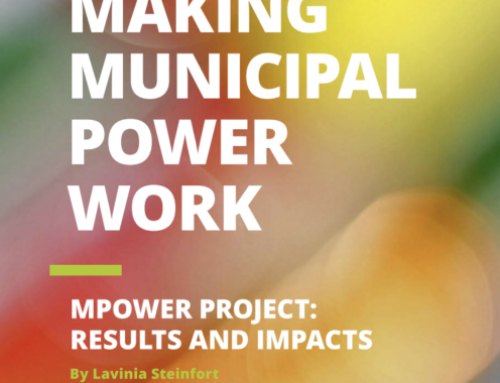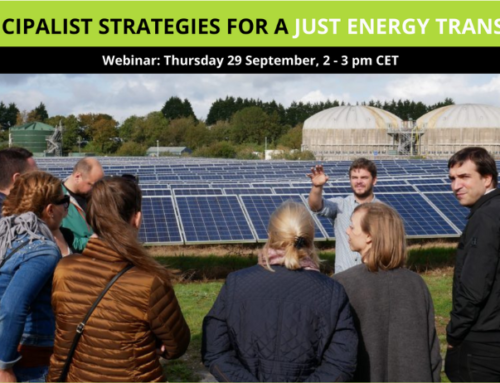Unlocking Municipal Energy Futures – National Policy Briefing

by Helen Traill and Andrew Cumbers
It is now well acknowledged that local action at the municipal level is essential to help deliver a post-carbon energy transition. There is considerable enthusiasm among municipal and city governments to play an active role in the changes required to facilitate an energy transition, but they need much greater devolved power and resources to develop their strategies for change. However, if municipalities are to succeed, national governments must take the lead in challenging and changing broader regulatory cultures that prioritise profit and marketisation over the provision of critical public services. This should include a questioning of the limits to EU policies that favour marketisation and competitiveness dynamics over strategic planning for social and ecological needs.
Building on our findings from the mPower project, we make the following five national policy recommendations.
1 — Policy coordination across scales is essential to facilitate the speed of energy transition required to address the climate emergency.
2 — The transition to a cleaner energy future requires direct, dedicated and sustained public funding. National governments should provide a secure and ring-fenced funding landscape.
3 — Building local capacity, in terms of staffing and expertise, which has been badly hit by austerity cuts, is critical to supporting municipal transition.
4 — Sufficient powers should be devolved to support municipal leadership as a democratic and empowering pathway to energy transition.
5 — As ownership of key assets, especially buildings but also energy service companies, is important for municipal transition, support should be provided for local control over key resources and infrastructures on which to build a local transition.
There is a welcome increase in municipal level action to tackle climate change and facilitate an energy transition away from fossil fuels. Opportunities exist to work with and catalyse this action for meeting climate goals, but municipal authorities and governments report blockages that sit outside their jurisdictions to change. A common theme across otherwise diverse municipalities are a set of blockages and constraints at the level of national governments. This briefing makes a series of policy recommendations to address these and enable municipal authorities to realise their full potential.
The municipal level is recognised as a key terrain for decarbonising the economy. This is especially the case around energy efficiency (highlighted as important in the European Union’s energy efficiency first principle) and democratic legitimacy (especially in facilitating citizen participation). The municipal level is also the scale at which many essential services operate and are planned and regulated. This briefing draws on the findings, conversations and shared collective learning experiences of the msPOWER project. Funded by the Horizon 2020 programme, mPOWER has involved an in-depth, wide-scale and systematic peerto-peer learning activities among over 100 local public authorities, with the aim of replicating innovative best practices in municipal energy and developing ambitious energy transition plans.
Municipalities need supportive and enabling policy environments at other geographical scales, particularly the national scale, to fulfil their potential in the drive towards energy transition. To make best use of localised ambition and action, national policy landscapes must support and reflect ongoing conversations about transition to low-carbon energy. This policy briefing offers suggestions at the national level for principles and policies that support the local transitions that draw upon our research findings.
Download the full National Policy Briefing: Unlocking Municipal Energy Futures










